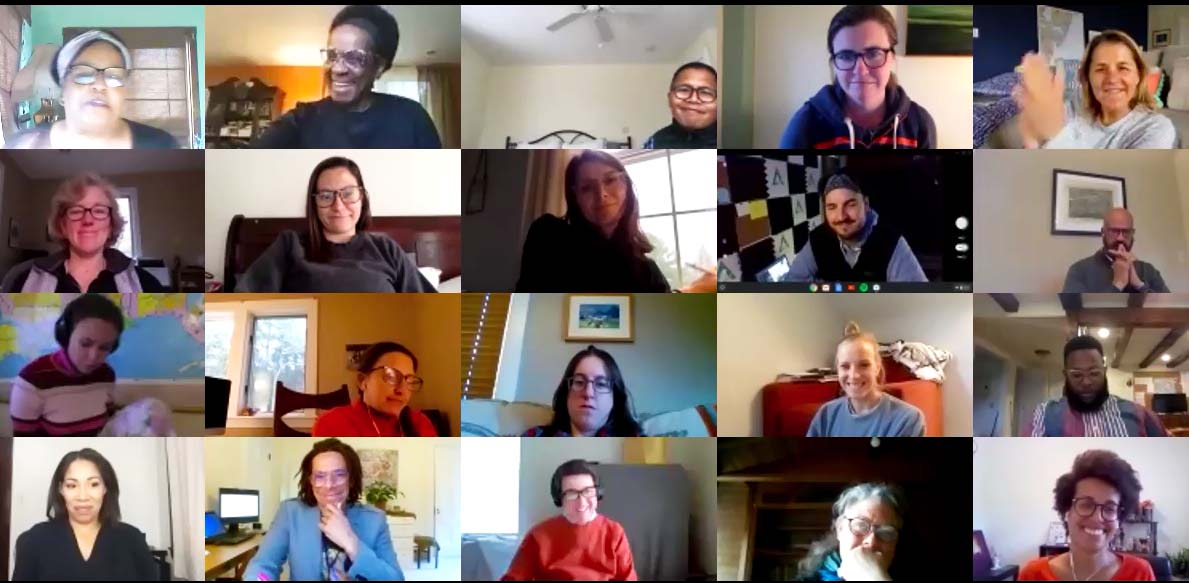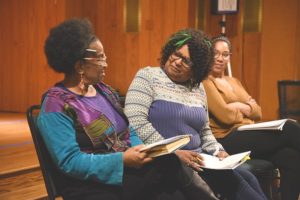



Despite difficulties, a dramatic production this spring helped get students and teachers in Maine talking thoughtfully about race and justice, just as Green Acre Baha’i School staff hoped it would.
Unsurprisingly, it was the COVID-19 pandemic that created the difficulties. The presentation of The Bus Stop, written and directed by Najee A. Brown, was reduced from the entire play to one key scene. Instead of a full theatrical stage, it had to be adapted to the limits of an internet videoconference.
Still, the performance stimulated “honest and genuine conversation,” according to one high school’s feedback.
And some of the creative thought generated in adapting the play is being carried forward as Green Acre continues to present artistic efforts on the theme “Pupil of the Eye.”
Green Acre, a Baha’i center of learning in Eliot, Maine, had a lot of initiatives in the works when the pandemic disrupted operations in March. Plans were proceeding at full steam for spring and summer programs for education, training in service, and community discourse. A new website had been designed to serve the center’s developing role as a space for learning, consultation, action and reflection.


Then there was the artistic outreach. For over a year, Green Acre has hosted artistic events to engage the general community and elevate discourse around themes of justice, nobility and the oneness of humanity. The “Pupil of the Eye” theme honors Baha’i teachings that liken the spiritual station of Black people to the dark center of the eye, through which “the light of the spirit shineth forth.” Many of these events focus on visual arts, with music and poetry also offered at each art show’s premiere.
The Bus Stop was set for an April premiere at Green Acre. Outreaches to area colleges and high schools were planned for May to engage students in meaningful conversation on the themes of the play. Brown, the author, was invited to serve as artist-in-residence.
The play focuses on the lives and relationships of five Black women waiting at a bus stop to visit their incarcerated loved ones. Casting was complete and rehearsals had begun when the pandemic forced Green Acre to temporarily halt public activities.
So even as the school’s team quickly acted to adapt educational and devotional programs to be offered via the website, Zoom and social media, The Bus Stop underwent a similar transition.
With in-person performances canceled, the playwright rewrote a single scene and worked with the actors to perform over Zoom for a focus group. In parallel, the Green Acre team developed a dialogue space about the play’s themes — including the power of words, forgiveness, resilience, and generation gaps.


Performance of the scene and testimonials from the actors were incorporated into the online dialogue space. These were combined into late April and early May workshops for two schools in Maine:
Robert Sapiro, administrator at Green Acre, reflects: “Because of the love, unity and capacity of this team, we weren’t able just to survive the challenges of the pandemic, we were able to create new opportunities that propelled us further to our larger goal of connecting with and empowering youth in our area.”
In a similar vein, plans for the “Pupil of the Eye” art series have evolved. Artwork, videos and more conversation spaces are being offered through Green Acre’s new website.


![]()
![]()
Whether you are exploring the Bahá'í Faith or looking to become an active member, there are various ways you can connect with our community.
Please ensure that all the Required Fields* are completed before submitting.